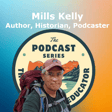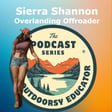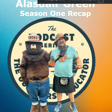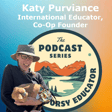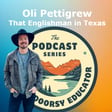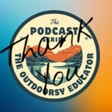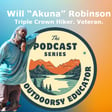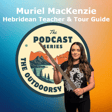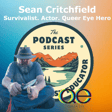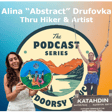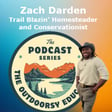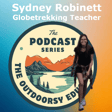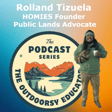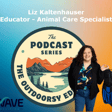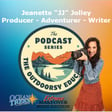Become a Creator today!Start creating today - Share your story with the world!
Start for free
00:00:00
00:00:01

Laura Clark
Our guest this week is the record holding mountaineer and all-around epic outdoorswoman Laura Clark! Join us as we discuss the importance of showing children outdoor skills and why we should never give up on our goals.
Recommended
Transcript
Introduction to the Outdoorsy Educator Podcast
00:00:00
Speaker
Hello and welcome to the Outdoorsy Educator Podcast, the show where curiosity meets the open road. I'm your host Alistair and I invite you to join me as we explore the world through travel, nature, getting outside and the power of learning.
00:00:17
Speaker
Each episode we will dive into stories from inspiring educators, adventurers and global citizens who are reshaping what it means to learn whether it's in a classroom, on a mountain trail, or even halfway across the world. From backpacking trips that change your perspective to educational journeys that transform communities, we will cover it all. So pack your curiosity, lace up your boots, and let's discover how the world teaches us.
00:00:44
Speaker
One step, one story, one adventure at a time.
Laura Clark's Background and Connection to the Rockies
00:00:52
Speaker
Laura Clark was born in California but has called the Rocky Mountains home for the past 20 years. With a lifelong connection to the outdoors, beginning as a dedicated Girl Scout, she has spent decades teaching survival skills and empowering others to thrive in nature.
00:01:09
Speaker
As the first woman to solo all of Colorado's 14ers, she continues to blaze trails both literally and figuratively hosting Girl Scout groups on her land and inspiring the next generation of outdoor adventurers.
00:01:25
Speaker
Well today we have joining us Laura Clark. Laura thank you so much for joining me on the show. How are you doing today? I am doing great. It's an absolutely beautiful day in Colorado, which most are, but wonderful day. yeah Doing good.
00:01:38
Speaker
Yeah. I've been to Colorado just a few times. I've been to Denver, Rocky Mountain National Park in sort of areas south of Denver as we've driven up to it. And it's always, I'm sure it's not always beautiful, but it always seems to be beautiful.
00:01:52
Speaker
um a love A lovely part of the country. So whereabouts in Colorado, where, you know, roughly where are you? Right in the middle of the state near Fair Play, Breckenridge area. Most people will know what airplane is, but Bruckenridge area, we're about 9,500 feet up here and love mountain views. We get to see all sorts of mountains just living here and wildlife. We have elk and pronghorn and deer and all sorts of fun stuff out here.
00:02:20
Speaker
I love it. Yeah, I've got some some family members who frequent to the area and they they go back time and time again for good reason. They absolutely love it. um But yeah, why don't you start off telling us just a little bit about yourself, who you are, and what is it sort of you do on a day-to-day basis?
Mountaineering Achievements and Goals
00:02:38
Speaker
Okay, so my name is Laura Clark. I have a full-time job, but I consider myself a mountaineer. i climb about 150 peaks a year living in Colorado. I am the first female to climb Colorado's 14 or solo and a 14 or is a peak above 14,000 feet.
00:02:55
Speaker
I've also done the bicentennial solo and that's the 200 highest peaks in the state. It is my goal to be the first person to solo climb all of Colorado's 13 years solo and we have 584 of those. I'm about 80
00:03:11
Speaker
I love Girl Scouts. I love kids. I love sharing outdoor survival skills with other people and getting people that wouldn't think they're okay going out solo or going out hiking, giving them the skills to do that.
00:03:23
Speaker
That's kind of my passion is, no, you can do this. I started off not knowing what I was doing, made a lot of mistakes, learned a lot around the way as I'm going. And it's kind of my goal to get people out there and know you you can do this. Let's just give you the skills, go have fun.
00:03:37
Speaker
We have so many, especially in Colorado, so many places to go that are fantastic that I want people out there discovering them. I've got so many questions, but i mean, that's such incredible stuff. So you said you did all the the the first female to do all the 14ers.
00:03:54
Speaker
Is that correct? The first to solo them, to do them by myself. To solo them. That's, that's, I hope that's. By myself. I hope there's a plaque somewhere with your name on it. There should be. That's an incredible achievement. It's much better. The people that did it a long time ago, like now I've got GPS and stuff like that, but you've got some women that did it in the 1920s without any of that. They're the people that need the plaques made for them. Like they did it They did it harder, much harder. And because they did it, now I can do it.
Creating and Sharing Hiking Resources
00:04:27
Speaker
So I also have a website where every single hike I do, every peak I climb, I put detailed pictures, like 50 to 100 pictures of the way to get up mountains and back down to keep people safe. Because I want to like pass that on. My website's all free. Nobody has to pay for it. If you want to climb this mountain, here's what it looks like.
00:04:45
Speaker
And I keep it free because I can climb what I do because other people did that as well. They recorded what they did and I take their information and like I use it. um Some of the peaks I climb are really rarely climbed.
00:04:57
Speaker
And that's really another reason to get get that information out there. How hard is this peak to climb? Can I actually do this? Do I need ropes? Right. Yeah. I love that. Yeah, I always try to think of these outdoors experiences and really anything.
00:05:11
Speaker
It's all just passing through us. You know, there's people who have gone before us who have achieved things, done things, learned things, and there will be people after us. So it's it's our re responsibility as human beings to just you know to carry this information and realize the weight and the responsibility of it.
00:05:26
Speaker
and But we have that duty and obligation to pass it forward, which it sounds like exactly what you're doing with your work with the Girl Scouts. Yeah, and to do it safely. That's simply incredible. I want people to go out there and to know what they're getting into before they go. This is exactly what it's going to look like.
00:05:42
Speaker
You don't have the skills. Like when I first started, I didn't have the skills. I got to some things and I went, I can't do that. I turned around and i went back home. It's always okay to turn around on a mountain every time. That's the right decision if you feel comfortable.
00:05:56
Speaker
And would I joined a climbing gym and I learned how to use ropes and how to rock climb and all that stuff. And then went back and was able to be successful. But it's nice to know before you go if that's the skill you need or if you're just following a trail all the way to the top.
00:06:09
Speaker
So I was going to ask you, how did you start off climbing? Is this something you grew up doing or something you came to a little bit later
From Girl Scout to Serious Mountaineer
00:06:16
Speaker
on? I have always been a hiker. I've always been a hiker. um i was a Girl Scout my entire life from the time I was six. And I went to Girl Scout camp and they always had an option like, do you want to climb the nearby peak?
00:06:27
Speaker
And we'd have you know four or five really brave counselors that would take all of us 10-year-olds up to the top of the peak and we were all dusty and dirty. And I loved it. That to me was absolutely amazing.
00:06:39
Speaker
I loved hiking, I loved doing it. And we could see the entire camp below us from the peak. And I looked at all those people swimming in the pond or in the pool and I'm like, you could be up here right now. It was cool to me. They were loving what they were doing, but I was really loving hiking.
00:06:53
Speaker
But I didn't get into mountaineering until about 2014 when I was taking a group of Girl Scouts up Pikes Peak. I'm a very involved leader and I'll do whatever these girls want to do. And they wanted to backpack up Pikes Peak.
00:07:06
Speaker
So we decided to do it, made it a three day trip. And on, on the way down, there was a freak snowstorm. This was August, which is pretty much summer conditions for us, but mountains make their own weather. We got six inches of snow.
00:07:21
Speaker
They ended up rescuing seven different people that day who were very, very ill-prepared. using all the skills they had learned that we had been talking about for years. They got the Red Cross hometown hero of the year award and spirit of the Springs award and a bunch of awards for doing it.
00:07:37
Speaker
Just rescuing these people that couldn't start a fire. They didn't have the right clothing. They were hypothermic, all this kind of stuff. It was exciting for them. And i enjoyed I enjoyed the experience. It was a ton of fun being with them.
00:07:52
Speaker
And I went, you know what? This is a fun hike. We did it in three days. I could do it in a day easy. So I started doing it. I started doing it once a week. Every Friday i would do it. I would drop my kids off for school and I'd climb it and I'd come back down.
00:08:04
Speaker
And now this isn't an easy hike. It's 26 miles round trip with 7,500 feet of elevation gain. But I was able to do it in 70 and a half hours so over and over and over again. And I had done it a couple dozen times. This was just like my Friday workout. I'm like, yeah, okay, I'm going to do this.
00:08:18
Speaker
And somebody goes, so how many 14ers have you done? On my way down, I met somebody and she asked me this and I'm like, well, what's a 14er? i didn't even know we had all these mountains in Colorado that I could climb. And then I was hooked. I'm like, I don't have to the same hike every day.
00:08:32
Speaker
I can pick something else. This is fantastic. There's a whole bunch of these. And I did all the 14ers. There's 58 in Colorado. I did them all in a year. And then I had to keep going, right? ah Yeah, I did them all in a year. And then i just wanted to keep going. So I started the 13ers and I really started this in 2017. I started the 14ers in 2017 for three years. I hiked Pike's Peak every Friday and then, and then realized, oh, there's more.
00:09:00
Speaker
And started really going at it and loving it. Just the different terrain. Cause while Pike's peak is a long hike and it is strenuous, it's class one. So that means there's a trail all the way to the top with all these other ones I was finding, Oh, I have to navigate my own way. I've got to use a compass. I have to figure this out. And that just engaged my brain a little bit more.
00:09:18
Speaker
And I got excited. I'm going to see different stuff. There's different animals in this part of the state. You know, I know if I hike this mountain, I'm going to see bighorn sheep, where if I hike this one, I'm going to see mountain goats or moose or something like that. And it became right became an an addiction. It really did.
00:09:32
Speaker
I could see you. I could see that that knowing my nature, too, it could very easily become something you go to sleep thinking about and wake up thinking about. And it becomes such an important part of your identity, I'm sure.
00:09:46
Speaker
Yes, it consumes me all the time. Even today, like I'm looking, what am I going to do tomorrow? What mountain am I going to climb tomorrow? What does the weather look like? Is the road passable? Can I actually get to the trailhead? Because we're still melting out here in Colorado right now. There are some trailheads I can't get to. Like the gates close 20 miles before where I need to park. So what what looks good? Where's the snow level? What am I doing? And ready to head out again tomorrow.
00:10:09
Speaker
Climb a mountain. That's wonderful. It's always put things in perspective for me. So I live just north of Dallas, but from Scotland. And there's a similar sort of vibe about Munroes in Scotland, to which are basically big hills.
00:10:23
Speaker
and And people, it's called Munro bagging, you know where people are trying to do all of them. There's a couple of hundred, I think. They're 3,000 feet. And it puts things in perspective a bit with just how majestic Colorado is and quite how beautiful it is.
00:10:39
Speaker
to have what what was it about 150 peaks over 14,000 feet? Oh, no, there's 58 above 14,000 and there's 584 above And then a lot more above 12 and 11. I mean, there's so much hiking here. You can hike someplace every single day for the rest of your life and never double a hike.
00:10:59
Speaker
It's just just amazing. um Yeah, it's something i've I've driven up Pikes Peak, but that's the that's the easy way out, you know. But I do remember it being about 40 degrees difference at the the top as opposed to the bottom. It was it was warm when we when we set off.
00:11:16
Speaker
Yes, that is definitely different when you're 14,000 feet up. Definitely much colder. Yeah. Yeah. yeah There's a picture of my wife somewhere with her sunglasses and t-shirt and all that at the bottom and then catching snow in her hands at the top.
00:11:31
Speaker
Like just little flakes of snow, but it was absolutely just absolutely stunning. yeah um So tell me more about the girls. ah let go ahead Sorry with that. The first time I went up Pikes Peak, I was eight. My parents drove me to the top, but we had been staying in a hotel and I had a bathing suit on.
00:11:48
Speaker
just because i was eight, right? I had a bathing suit on. right But after it was snowing at the top and I got out and, and, Walked around a little bit, got right back in the car. But yeah, I was on top of Pikes Peak in a bathing suit when I was younger, just for fun.
00:12:02
Speaker
I love that. I love that you have that memory, too. That's fantastic. um So talk to me a little bit more about the Girl Scouts. Obviously, you were in the Girl Scouts as a child, and I think you said you have children now.
00:12:14
Speaker
But what role does being a leader within the Girl Scouts organization you know play in your life now?
Leadership and Influence in Girl Scouts
00:12:20
Speaker
Okay. So I've been a Girl Scout since I was six. My mom was a Girl Scout. My grandma was a Girl Scout. I knew when I had kids, my daughters were going to be Girl Scouts.
00:12:28
Speaker
I knew that. And because it's such an amazing organization. It it it is has wonderful programming. If you get the right leader in there and you execute the programming correctly, these girls are going to do phenomenal.
00:12:42
Speaker
And I had been in a lot of troops when I was younger. I was in good troops and I was in bad troops. And sometimes... Well, most of the time, the leader's only there for a couple of years. So you don't have continuity with what you're doing and growing and learning the skills in order.
00:12:57
Speaker
Outdoor survival skills, you really, it's a progression thing. You need to learn something so you can learn something else so you can learn something else. So when I had daughters and I'm like, I want you in Girl Scouts, I realized I needed to be their leader if I wanted them to have the best experience.
00:13:10
Speaker
I wanted them to have one troop the entire time. I didn't want them merging with other troops and all that kind of stuff. I wanted the continuity. My girls luckily loved doing it, which was really helpful. And I love doing it. And I found as an adult being a leader, I learned so much more than I learned as a girl.
00:13:28
Speaker
I took everything I learned as a girl and as a Girl Scout and then had to apply it differently because now I'm the teacher, right? Like now I'm teaching it. So I really have to know what I'm doing. And it's a huge passion of mine. the all The whole organization is a huge passion of mine. When it's implemented correctly, it is life changing for these girls.
00:13:46
Speaker
And now I've got five kids between the ages of 21 and 26. and twenty six And I have a lot of Girl Scouts that are in their 30s and a lot of, almost all of them have graduated college by this point.
00:13:57
Speaker
And they're having their own families. They're getting married, having kids. They're putting their kids in scouting. And it's like, it mattered. It it was good enough for them. They enjoyed it enough to say, I want my kids to do this.
00:14:08
Speaker
And that's amazing as a volunteer. What bigger compliment is there than that? Exactly. Exactly. and And even though my kids are grown, I still volunteer. So this weekend I had a ah troop of girls in middle school come stay at our property and they were working on an engineering badge. So we taught them how to build a bridge and they got to build a bridge and it went over our Creek and they got to paint our outhouse, which, you know, they like to paint. So that was more fun for them than learning, but, right but they also got other skills. We went hiking, we did animal ID, we did nature tracking, we found bones and figured out what animals, those bones were from.
00:14:44
Speaker
and they're learning stuff without realizing they're learning stuff, right? They're learning, oh, I see these tracks. What are they? Let's look at the scat out here. Which way is the animal moving? Is it going away from us or coming towards us? And what is it? Should we be scared that this animal's here? Should we be excited this animal is here?
00:14:59
Speaker
And I know several of the girls today, they left just a couple hours ago, and they're like, we don't want to leave. We love it out here. And that's That's cool. Kids do like being in nature. They don't necessarily need their iPad or their phone or you know screen time all the time.
00:15:15
Speaker
They really come alive when they're just outside enjoying nature. I love the way you phrase that. That's really the motivation but behind starting this podcast is I've been in education really my whole career. and um And whenever we take it, so we're kind of in the the Dallas Metroplex.
00:15:34
Speaker
It's pretty urban where we are. And so there's a lot of the kids we serve really don't ever leave this area as children. um except when we take them to science camp, which is about where we usually take them. it's about 70 or 80 miles out.
00:15:50
Speaker
um and And you just see them almost shed this layer of armor that they've carried around with them when they're in their sort of home setting or school setting they have to be tough they have to be it's a survival mechanism and suddenly all these kids that are all about the fashion the ipads of this and that are playing with sticks and they're just chasing each other around and there's laughter and it's just amazing and that's what keeps me going and keeps me thinking how can we mesh these two worlds of education and the outdoors together
00:16:25
Speaker
Yes. And in my i my head, yes. I mean, the kids that normally, and I see that too, there are there are no i there's no, we told them this, you can't charge your phone out here. We don't have a way to do that. So you don't have it.
00:16:38
Speaker
And camping or being in the outdoors puts everybody on the same playing level, right? Like you've all got a sleeping bag, but you've all got to cook together and do things together. And it doesn't matter how much money you have at home or what you're doing at home, you're here, we're a team and we're going to make this happen.
00:16:53
Speaker
I had a lot of girls in my troops from different schools. They they you know were all together maybe in elementary school, but as they got older, they went to different middle schools and high schools. And I see a lot of kids that they kind of get stuck in this, I have to be this person at school because it's what I was put into. I'm in this group. I'm in this friend group. and I've got to act this way.
00:17:12
Speaker
But when they would come to Scouts, they could totally be themselves. it didn't matter what their social status was in school. They would come to scouts and they are who they are. We know this person is good at this. You get to be in charge of this.
00:17:24
Speaker
You're good at teaching this. You're going to do this. And everybody enjoyed everybody else's skills. Yeah. Your personality is not the best. We're not going to be best friends, but we're going to get along. And I know that if I ask you to do something, it's going to get done.
00:17:35
Speaker
And that was, it was wonderful to see my girls grow up with that where, yeah, we would never be in the same social circles, but now, I mean, even now, my oldest, they're all, like i said, they're in their late 20s, early 30s.
00:17:50
Speaker
They all meet for coffee. They do stuff together, but they would never have done stuff. Like one of my girls was captain of the boys ice hockey team in high school. We all went to see her play a game. Right. And then somebody else was really big in the theater and we all went to go see her in a play.
00:18:07
Speaker
They wouldn't have been friends in school. They wouldn't have been in the same social circles at all. But yet it was really cool to go to that hockey game and to cheer her on or to go to the play and bring her flowers and all that kind of stuff. They made they made great friends that they wouldn't have normally been friends with because at school you got to be a different person. Right. You've got this little shell around you that says this is the status I have and I got to stay in that.
00:18:29
Speaker
Yeah, that's absolutely what we see as well. And I mean, while you were talking, I was just thinking, I mean, these are lifelong transferable skills, whether it's, you know, a teacher in the classroom or yeah as somebody in a boardroom, you know, being able to get along with people that you wouldn't necessarily get along with, but for the sake of a common goal, for a purpose, there's bigger things going on than whether you like or don't like each other.
00:18:53
Speaker
And how far of that skill could take people in life in a hundred different professions, careers, whatever it might be. Like what a valuable skill to have learned at such a young age.
Solo Hiking Challenges and Personal Growth
00:19:05
Speaker
Yeah, that was very well stated. But yes, absolutely. We all have to deal with people we don't like, but they might, I mean, they're there for a purpose. We have to deal with them. And yeah, how do you do that? You don't have to be best friends, but you do got to get along.
00:19:16
Speaker
and Got to work together. we We've got to figure this one out together. Absolutely. um So really thinking about Girl Scouts and maybe your your own career and and doing all these 14ers, what do you think is the biggest leap of faith you've ever taken?
00:19:32
Speaker
that Well, and this doesn't really fit with that, but just when I got a divorce, I had to do everything on my own. And that's when I actually started mountaineering and hiking and going out on my own. I wouldn't have done it had I not get gotten a divorce. I wouldn't have gone solo. I didn't have anybody to go with. Right. Like, and that was scary. Right.
00:19:51
Speaker
was really scary, especially a lot of these peaks. You've got to start at two or three in the morning to get them done before the storms come in. So I'd be hiking at night by myself for hours on end with all these other animals that I know are out there. And that was really, really scary to get over just um I don't know what's out there and I'm hearing stuff, but eventually I got to a place where I'm like, I could actually smell animals.
00:20:14
Speaker
I could smell if they were in the area kind of thing, but the whole going solo thing was hard. That was hard. And it was mainly because I didn't have anybody to go with me, but I wanted to go.
00:20:24
Speaker
Right. Like I wanted to go. I knew I had the skills to go. And the first couple times I did stuff, I'd have somebody, but they weren't into it like I was. They weren't going to go every week. They weren't going to go four times a week. That's a really small subset of the population that really likes that kind of exercise. Right. Couldn't find them. and And going solo was the hardest thing in the beginning.
00:20:46
Speaker
But I eventually got over that because wasn't. I knew I had the skills. I've been training the skills, right? I've been training them for years. I figured if i anybody needed help, I'd be the one rescuing them anyway. So I might as well do it.
00:20:59
Speaker
Might as well go. But yeah, go himself. I love that. i I suspect that, I mean, again, all i could I'm thinking about now is what a metaphor that is for something I'm sure a lot of people go through.
00:21:12
Speaker
Whether, you know, getting divorced is not no uncommon and and people almost always have to take a leap of faith into the unknown, whether it's climbing or moving into their own house or as starting a new career.
00:21:25
Speaker
So I think the divorce can really make us have to take these leaps. um ah What beautiful metaphor, um a more beautiful metaphor is there other than having to climb up a mountain by yourself in the dark, um but it'd be so rewarding in the end.
00:21:42
Speaker
Yes, and it actually just it gave me clarity. It really did. Hiking solo gave me time to think and to become a better person. Like when you're out there, you're you're living with your thoughts, right? You're by yourself and you're hiking for 10 hours at a time and you get to go through all the wonderful decisions you made and all the bad decisions you made.
00:22:01
Speaker
And you get to go through what's going on at work or what are my kids doing or how am I dealing with this relationship? And you can yell and scream to yourself all the things you want to say. You want to say all this negative stuff. You can say it and then you can go through it and go, that's not the adult way to handle this. This is not how normal people would handle it.
00:22:18
Speaker
I can get it out and then I can go, no, the right way to handle this situation is to be the better person. This is what I'm going to do. This is how I'm going handle the situation. This is gonna how ah I'm going to handle how my kids are doing in school or relationship with you know my significant other or my parents or whatever it is going on in my life, coworker.
00:22:36
Speaker
and do the right thing, but still get enough time to say all the nasty things in my head I really want to say, that you shouldn't say, right? Like, it's not that's not going to help anything. I want to react this way. That is not the right way to react. So let me say it. Let me cry. Sometimes there's a lot of crying involved.
00:22:54
Speaker
And then, okay, I'm going to be the bigger person. i'm going to handle it this way. Yeah, no, I love that. So once or twice a year, I'll go multi-day hikes by myself. and said You don't realize how distracted we all are all the time until you have nobody around you, essentially nothing to do, and suddenly your brain can just decompress and start thinking about all these things you just mentioned, good decisions, bad decisions.
00:23:20
Speaker
indecisions and you get a chance just to reflect. so and Every time I come back home after being away for a couple of days, it is with a renewed sense of clarity. As you said, it does give you that.
00:23:31
Speaker
Yes. You're saying that, like that that is i I need it personally. At this point, I've been doing it for so long, I need it. and My husband now, when I get a little testy, he's like, honey, you need to go on a hike.
00:23:42
Speaker
Because he knows that when I do that, I'll get to process things and I i just come back a nicer person, right? I just come back a nicer person. And he means it lovingly. He doesn't mean it negatively. but He's like, you know, you really do need to go on a hike. Okay.
00:23:54
Speaker
Okay. um I'll go on a hike tomorrow. And yeah, i'll I'll realize, okay, maybe I wasn't as nice as I should have been about this. Or maybe I didn't thank him enough for this or appreciate this or whatever. Or maybe, I mean, maybe not, but usually it's, yeah, I was being a little testy this week. Okay.
00:24:10
Speaker
I see it. my wife please the My wife is reading from the same playbook as your husband, it sounds like. Because there'll be times that I'm like you know stressed out about something or you know something's going on and I think I'm coping with it and she'll just go, do you just do you need to go camping for a night?
00:24:27
Speaker
Why don't you head out for a night and she'll call it before I realize it. Exactly, exactly. these and I won't even realize it. Yeah. Yep. One of the secrets to a long and happy relationship. Absolutely.
00:24:42
Speaker
Now, if you could spend one day in somebody else's shoes, who do you think it would be and why? Does it have to be somebody living? It does not. No, it could be anybody.
00:24:54
Speaker
I would say, honestly, Sacagawea or Sacagawea however we say her name now, but I would absolutely love to have seen what she saw and to bring Lewis and Clark over and That to me would be fantastic. I would love to see what she did, how she lived it. I know she was young. She was like 16 to 20 when she was doing that, but just to see her point of view and how she navigated at that time.
00:25:19
Speaker
i have great navigation tools that I use. I can also navigate without them, but I would love to know how she did it and what she saw and how she explained things and what they called things. That to me would be amazing.
00:25:32
Speaker
Yeah, that would, I mean, what fascinating part is if you could even just yep sit down for a meal with somebody like that just to, yeah so ah how they did absolutely unbelievable. um What does success mean to you now? And how do you think your definition of success has changed over the years?
Redefining Success Through Outdoor Adventures
00:25:50
Speaker
ah Success to me right now is just being happy. For a long time, I went through a really i went through a bad divorce and had no money. i had no money for a decade. I was trying. I was working. I had kids to raise. I'm trying to raise them what I felt was the right way, putting them in sports and putting them in music and putting them in scouting.
00:26:07
Speaker
And I did all that, but I had no money the entire time. And I thought to myself, okay, if I can just save a little bit of money, like I don't even have enough to make a house payment. If I don't make it this month, I don't have anything left over to make another one. I had no no money in the bank. I zeroed out every month on my kids. Don't regret that at all.
00:26:27
Speaker
But that was very, very difficult to go through. And I was always thinking, oh, if I just had you know two months, three months worth of bills in the bank, that would make me happy, right? Because then I have security and I would know that if something happened, I'd be okay. I went for a decade knowing if I broke my leg or if I lost my job,
00:26:45
Speaker
I can't raise my kids. lost Laura's video. Now that my kids are out of the house and I'm an empty nester, I don't worry. si There we go. So Laura just dropped the line, dropped her just a second, but Laura, you are back.
00:26:58
Speaker
Okay. Awesome. So I think I just said that, you know, I didn't have enough money to raise my kids. I barely made it, you know, barely every month, nothing left over. And I really thought that having money would make me happy or feel successful.
00:27:12
Speaker
And now that they've, I mean, I've been an empty nester for four years, I have realized that that's not it. I am happy in the middle of nowhere just sitting by a stream. Right now, as I'm talking to you, I can see a pronghorn antelope walking outside of my door.
00:27:27
Speaker
That is amazing. That's making me happy right now, being in the middle of nowhere, listening to the stream running down and calm, not dealing with a lot of people. knowing that I did good this weekend. I know I did good, right? Like, you know, I had a bunch of Girl Scouts here this weekend. I changed their life.
00:27:44
Speaker
That is my happiness and that is success to me. They were all, they were thrilled. We didn't have anything go wrong this weekend. Nobody got hurt. Everybody had fun. They were laughing. They were getting along. They learned a ton of new skills.
00:27:59
Speaker
I feel good about that. That's success to me. It's not money anymore. It was before because I just needed to get by. But once I could get by, then it didn't matter. And it was just what is happiness to me. And happiness is being in the middle of nowhere and climbing mountains all the time.
00:28:15
Speaker
Or having i love it that's over teaching scouts that, you know, that's fun. I love it. Yeah. It's, I've never really looked into it, but I've always, just but you know, people think money, money, money, but it's security.
00:28:30
Speaker
But also, you know, when people end up making a ton of money, does that really solve the problems that deep down that they were struggling with? Probably not. Life is always easier with some money in the bank. I get it, but I don't think it's and yeah the source of happiness, you know? Yeah, no.
00:28:47
Speaker
Security, security help.
00:28:50
Speaker
Absolutely, um without a doubt. um Now, I'm just fascinated. I just love the Girl Scout stories. Like, they just put a smile on my face, and I don't know, you know, these kids, of course, or anything, but just I can imagine what it's like.
00:29:04
Speaker
ah ah Can you tell me, is there one specific, obviously, don't tell me their name, but the specific child that has maybe said something that has just stuck with you throughout the years? You know, so I'm a teacher, and my wife's a teacher, and, you know, we sometimes have these, there's this moment with this child,
00:29:20
Speaker
and it put my whole career ah in a slightly new direction. On on a bad day, I remembered this child. is that Do you have such a a similar source of story? I probably have a ton, but one that comes to mind right away, we were hiking. We did Pikes Peak a lot. So after that first time when those girls ended up saving a bunch of people, we liked it. So we did it every year.
00:29:43
Speaker
And our troop was very inclusive. We had a lot of very high functioning girls and some that weren't. And we didn't necessarily say, we didn't say no. If somebody wanted to be in the troop, it didn't matter where you were um physically or mentally. If you were the right age, you could be in the troop.
00:29:58
Speaker
And one of the girls that we brought up Pikes Peak this time had just lost her father the week before. Her father had died. And she really wanted to go on this hike up Pikes Peak.
00:30:11
Speaker
This girl, I don't know exactly everything that was going on with her, but she did have some disabilities, no physical disabilities, but other disabilities that were very apparent, not really sure what they were, but It was a struggle. And she said to me before the hike, she's like, I just want to make it. Cause we talk about our team goals and what we want to do. And she's like, I just want to make it to the top.
00:30:30
Speaker
Okay. She had just lost her father. She had other issues she was dealing with as well. We're going to get to the top. It's a long hike, right? It's 13 miles to the top. This is a 26 mile round trip hike.
00:30:42
Speaker
And she did really well the first 10 miles. And then she kind of, that was it. But she told me she wanted to keep going. So, We weren't pushing her, but we were. We were like, come on, you got this, you got this, we'll hold hands, we'll climb together.
00:30:56
Speaker
i had girls that were you know would climb up a rock and then reach their hand down and help her to get up it. And it took a lot longer than it should have to normally do this hike. But we stuck with it and she stuck with it even though she was complaining, she still wanted to keep going.
00:31:12
Speaker
And we get to the top and we're at the top of Pike's Peak and this is a 14,000 foot peak. And she looks to the sky and she raises her fist and she goes, this is for you, dad, I made it. And I broke down. i just started crying. I was like, oh my gosh. Like she was doing it for her dad. She didn't tell us that beforehand, but that's the reason she wanted to summit. And I was just, I was so glad that, I mean, she did it. She did this, but I'm so glad that I didn't just say, nope, stop, sit, we're we're done.
00:31:41
Speaker
It was, she wanted to go and we kept pushing her along and she did it. And, and she was doing it for her dad. She was doing it in memory of her dad. She thought that was the closest place she could be just to say hi to him.
00:31:54
Speaker
I did not expect to feel that swell of emotion in this conversation. Like that um that, I mean, legit, like brings a tear to my eye. Like how sad, but how wonderful. iing it Yeah. Like, oh, that get i mean that gets me. That storm right in the heart.
00:32:10
Speaker
And it made it all worth it, right? It made all the whole, i i need to sit for a long time. I'm tired. and I don't want to keep it. I'm like, you told me. You told me you want to do this. And I didn't know didn't know the reason behind it. And yeah, that was...
00:32:22
Speaker
Very, very emotional and wonderful girl. What a wonderful beautiful, beautiful moment out such tragic circumstances. That really, really is. um Now, for the next six months, what do you see occupying a lot of your time, your thoughts and
Future Plans: Living on the Road and Traveling
00:32:37
Speaker
your resources? What does the immediate future hold for you?
00:32:40
Speaker
All right. So starting tomorrow, i will be living out of my truck for the next three months, going trailhead to trailhead, trying to finish these 88 peaks I have left. So the back of my truck is set up to live in. I've got a bed back there. I've got food. I've got a heater. I've got, you know, a place to use the restroom and I will just be trailhead to trailhead hiking these peaks until the weather gets too bad to sleep in the back of my truck anymore.
00:33:03
Speaker
And, and not just sleeping in the back of my truck. Sometimes it's just my vehicle to get to a trailhead and then I go backpacking from places. It's just a place to keep it. But that is my immediate, I'll be doing that until probably the middle of October, early November.
00:33:18
Speaker
that'll be right That'll be what I do. But you said six months. So after that, I'm a traveler. And I've got several trips planned. So I just got back from South America. I'll be heading to South Korea. One of my sons is stationed there right now.
00:33:31
Speaker
and I want to go visit him. right And then I've got a daughter graduating college in January. So we'll be taking her on a trip to the Caribbean. And my father-in-law just turned 75. So we're taking him on a trip.
00:33:44
Speaker
So yeah, next six months is mountaineering, mountaineering, mountaineering, mountaineering and then vacation. And then when I love everything about it. Yeah, i've I've learned wonderful. Well, this segues into yeah I've learned in the past few years to enjoy life.
00:34:00
Speaker
I'm not gonna be young forever. My grandpa's 97 and he's he's been telling me, he's still very there mentally, but physically he's just not there anymore. And he says the best time to travel is before you turn 70.
00:34:12
Speaker
Because once you're 70, you have all this free time, but your body's not necessarily where it was and it's harder. So he's 97 right now and he would love to travel. He has all the time in the world, but he cannot physically travel.
00:34:27
Speaker
He just can't. He's got the money to do it. He just, it's too hard on him. He can't do it. He's like, do it now. And I take that to heart. Yeah. Okay. If I'm supposed to do it before I get too old to do it, I'm doing it now.
00:34:39
Speaker
um I'm going experience it. We only get one life, Good for you. Do it. Exactly, exactly. And yeah, what what great ah great piece of advice. and Vacation is not the beach. like like are not sitting You see people that go to on vacation and they sit and read a book the whole time. I can do that at home, okay?
00:34:58
Speaker
If I'm not going to spend all this money to travel to this foreign country to sit on a beach, to me personally, that's fine if that's what you want to do but I want to learn the culture. I want to meet the people. I want to climb the peaks. I want to visit the rainforest. I want to go down that waterfall. I want to do whatever.
00:35:13
Speaker
I'm not sitting in a chair for a week. I'm not spending all that money to sit on the beach. I could do that. Yeah. I've never done that kind of trip, you know, where you just go and like sit in a hotel and sit in a chair.
00:35:26
Speaker
Never done it. I've got no desire to do it. It's just yeah like is exit the the the place I love to relax and unwind and just eager is um is on my own couch or my own back porch.
00:35:37
Speaker
It is home. I, you know, that's, this is, this is home base. I'd like to go and have adventures in the rest of the world. Yes. Yes. so this This segues quite nicely. You know, if people want to follow your adventures, they want to follow your, your your mountaineering.
00:35:53
Speaker
um Where can they find you? Are you on social media? Do you have, you mentioned you have a website. Well, unfortunately, we got disconnected just as Laura was about to share her social media accounts and where you can find her.
00:36:06
Speaker
First of all, I do want to say she has a book out on Amazon called Wild Wanderer. I'm sure it's available in other places too, but look for Wild Wanderer, soloing Colorado's 200 highest peaks you can find her on Instagram wild wanderer if you search for the handle at Laura underscore m underscore underscore Clark that's Laura underscore M underscore Clark you will find her there and she also has a website wild wanderer trip reports dot com she has got really really detailed accounts of adventures she's been on and tons of photos it's a great website
00:36:53
Speaker
Thanks again to this week's guest, and I hope today's episode sparked some curiosity, or perhaps even inspired your next adventure. If you enjoyed the show, please be sure to subscribe, leave a review, and consider sharing it with somebody who's always ready to explore.
00:37:10
Speaker
You can find more information at The Outdoorsy Educator on Instagram, TikTok and Facebook. Until the next time, keep wandering and keep wandering.
00:37:32
Speaker
um
